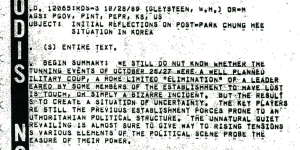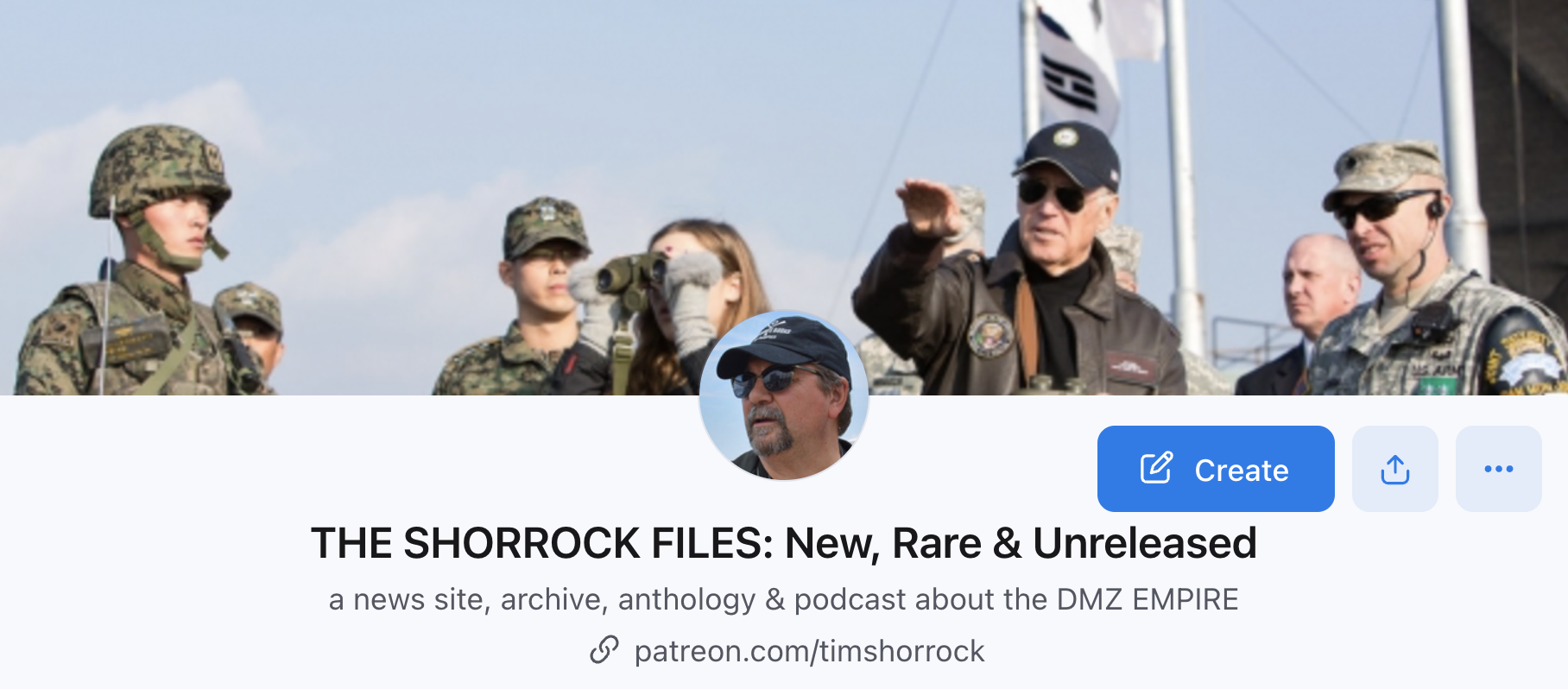BOX 2, FILE 2 (1979-1980)
These documents from the Cherokee Files help us understand the interventionary role played by the United States in the events in South Korea, from the Park assassination in October 1979 through the reluctant US acceptance of General Chun Doo Hwan as South Korea’s leader in the fall of 1980.

12/15/1979 and 12/19/1979 – These documents summarize important meetings between Richard Holbrooke, who was running President Carter’s Asia policies at the State Department, and the South Korean ambassador to the US Kim Yong-shik about the 12/12 Incident, when Chun Doo Hwan seized control of the ROK military.
In the first meeting, on 12/13, a day after Chun’s internal coup, Holbrooke warns Kim that the incident and violation of the CFC’s command structure holds “potentially grave implications for US-ROK relations.” Most of the meeting notes are blacked out. In the second meeting, on 12/19, Holbrooke tells Kim that the US had decided not to challenge Gen. Chun’s version of the events as long as Chun made a commitment to “broadly based political development” in South Korea. Here is the key phrase: Holbrooke “assured Amb. Kim that the [US government] would not publicly contest the [ROK government] version of recent events, but we would not wish to see further military changes of command ‘Korea-style.’” This is significant because essentially the US swept Chun’s coup within the military under the rug after receiving promises of liberalization from the government that were never kept.
5/3/1980 – This document from the US Embassy to the State Department describes in alarming terms how right-wing but influential US generals experienced in Korea have been visiting South Korea to meet with General Chun and other members of the 12/12 group to give them assurances they will be supported by the US. Essentially, these generals were going around the State Department. One of the US visitors was US General Richard Stillwell, a former US commander in South Korea. Among the Korean generals he met with were General Johnny Sohn and General Choi Kyong-Nok. The person who arranged Stilwell’s visit is blacked out, but the embassy says “we presume General Chun had a hand therein.”
5/9/1980 – Amb. Gleysteen summarizing his May 8 meetings with Gen. Chun Doo Hwan and Blue House official Choi. With Chun: “In a very long discussion of the student security situation, I think he probably found my attitude sympathetic” (this is one day after he told Chun the US “would not oppose” his use of military troops to put down the mass demonstrations). With Choi: “There is not change in the political schedule, caution regarding handling of the student and labor situations, and a good deal of moroseness [sadness] brought on by the student challenge and the unhelpful posture of the political opposition.”
5/13/1980 – This is an announcement to the US Embassy in Seoul about the White House meeting on May 22, 1980, in which the Carter administration agreed on a military solution to the Gwangju Uprising. The document states that the “timing may permit General Wickham to participate during his Washington visit,” and also notes that Secretary of State Muskie has appreciated Ambassador Gleysteen’s meetings with General Chun and Blue House Director General Choi Kwang Soo (“most helpful…an important addition to understanding of him.”) It is significant because it indicates that the US government was considering a military response to the political crisis of 1980 ever before martial law was declared on May 17, 1980.
5/27/1980 – In this document, Ambassador Gleysteen tells Secretary of State (Muskie) that he has been informed by Korean Foreign Minister Park Tong-jin that Chun Doo Hwan has created a ROK Committee for National Security Affairs to act as a “bridge” between the Martial Law Commanders and the civilian government. This is in effect the organization running the country as a result of the military coup of May 17. This is significant because it shows that Gleysteen was given advance notice of the coup government. He also writes: the committee “is a rather poor disguise for the military takeover that has occurred.” Much of the cable is blacked out.
5/29/1980 – This is a Gleysteen memo about another upcoming Carter administration meeting on Korea that will discuss how Koreans have responded to Gen. Chun’s coup and the military operation against Kwangju. It is significant because it shows that despite the Korean government’s earlier promises to take steps to reform the political system – promises completely dashed by the coup – the Carter administration was prepared to accept Chun’s actions. Chun and his group, Gleysteen admits, have taken “virtually complete control of the government.” He adds: “If by a reasonable test, most Koreans seem willing to live fairly comfortably with the newly emerging structure, we should be able to as well.” However, if a “majority manifest that they cannot tolerate the new leadership and resort to confrontation, there will either have to be a change or we will have to disengage.” In his mind, the situation is favorable. “Many Americans have been assuming that there is an overwhelmingly negative reaction among the Korean people, [but] scattered evidence suggests this may not necessarily be so.” This shows how easily the US could move the goalposts to suit US security and economic interests.
5/29/1980 – In this document, Gleysteen prepares Secretary of State Muskie for an upcoming press appearance to discuss Korea in the wake of the May 17 coup. It is significant because Gleysteen spells out very clearly why the US government backed a military solution to the events of May: “We were deeply bothered by the massive demonstrations in Seoul which threatened to get out of hand, and by the tragic events in Kwangju. We realize that the situation had to be controlled.” He also tells Muskie to say “I am not going to argue about whether there has or has not been a coup…The Korean Army, if only because of martial law, is playing a decisive role.” In other words, the US government is concealing what it knows: that Chun Doo Hwan seized power in a military coup and then was responsible sending troops to Kwangju who killed hundreds of people. Despite this knowledge, however, the Carter administration is ready to support Chun’s government.
6/21/1980 – This cable describes instructions from Deputy Secretary of State Warren Christopher to the US Embassy in Seoul on what to say to Korean leaders about US policy concerns. Underscoring the hypocrisy in the cable above denying a coup, Christopher states very clearly that there has been a coup: the US, he says, has “concluded that General Chun Doo Hwan and his colleagues have successfully established military control of the Korean government.” He then instructs Gleysteen what to say to Chun, including this statement: “We remain faithful to our commitment to ROK security and this is not an issue.” However, he adds that without “more broadly based support” in Korea for Chun, the US might consider “further troop withdrawals.” Without such support, “the necessary public and political support in the United States for our continued presence in Korea could be weakened.” This is significant because it shows that some officials within the US government were considering withdrawing American military forces from South Korea at that time.
8/15/1980 – In this cable, “Change in the Presidency,” Deputy Secretary of State Christopher spells out US views on Chun’s move to become South Korea’s president. This is after General Wickham, in an interview with AP, declared that US officials were ready to accept Chun as president. Christopher instructs the US embassy: “the Korean leadership should not misconstrue the statements attributed…to General Wickham as implying US government approval or support for General Chun.” Then, anticipating Korean anger against Wickham, he tells US embassy officials to “step up their security precautions against incidents which may be directed against them or American and Korean personnel.”
9/24/1980 – Gleysteen meets with Minister of National Defense Choo Young Bok, and emphasizes that “by moving steadily towards liberalization…relations between the US an Korea should develop cooperatively.” But he adds that an “adverse outcome” of the Kim Dae Jung trial would be “extremely damaging.” The second page, which consists of Choo’s response to Gleysteen, is almost entirely blacked out. This document is significant because it shows that the Carter administration had made a decision to back Gen. Chun’s takeover as long as Kim Dae Jung was spared severe punishment.
Use links below to view documents in PDF format:
- Initial Reflections on Post-Park Chung Hee Situation in Korea | October 28, 1979
- Korea Focus | ROK Ambassador Kim | December 15, 1979
- Korea Focus | Ambassador Kim | December 19, 1979
- Self-Deception by the ROK Military | May 3, 1980
- Korea Focus | Meetings with General Chun & Blue House Official Choi | May 9, 1980
- Korea Focus | PRC Meeting Scheduled | May 13, 1980
- Formation of a ROK Committee for National Security Affairs | May 27, 1980
- Korea Focus | USG Reactions to Developments in Korea | May 29, 1980
- Korea Focus | Assessment of Korean Reactions to Recent Events (1) | May 29, 1980
- Korea Focus | Assessment of Korean Reactions to Recent Events (2) | May 29, 1980
- Korea Focus | Instruction to Convey US Policy Concerns to Korean Leaders | June 21, 1980
- Change in the Presidency | August 15, 1980
- Call on Defense Minister Choo | September 24, 1980
